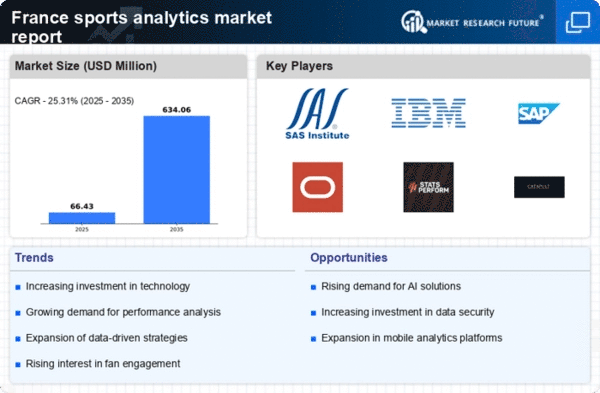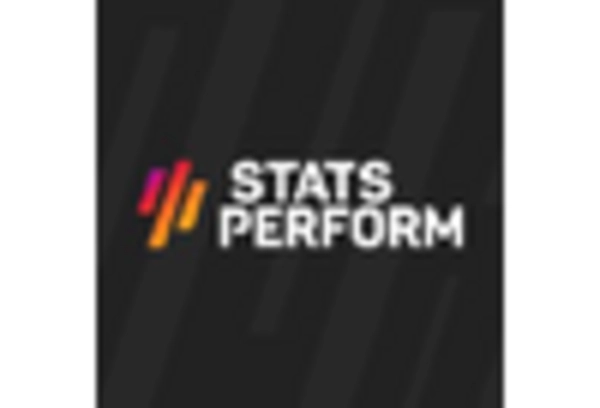Growing Popularity of Esports
The rise of esports in France has a profound impact on the sports analytics market. As esports gain mainstream popularity, the demand for analytics solutions tailored to this sector is increasing. In 2025, it is estimated that the esports market in France will reach €200 million, with a significant portion dedicated to analytics services. Organizations involved in esports are increasingly utilizing data analytics to enhance player performance, optimize team strategies, and improve viewer engagement. This trend not only diversifies the applications of analytics but also expands the overall market, as traditional sports organizations look to adopt similar strategies to engage with the growing esports audience.
Government Support for Sports Innovation
The French government actively promotes innovation within the sports sector, which significantly impacts the sports analytics market. Initiatives aimed at fostering technological advancements and research in sports analytics are gaining traction. For instance, funding programs and partnerships with academic institutions are being established to encourage the development of new analytics solutions. In 2025, government investments in sports technology are projected to reach €50 million, with a substantial portion allocated to analytics-related projects. This support not only enhances the capabilities of sports organizations but also stimulates the growth of startups focused on analytics solutions, thereby expanding the overall market landscape.
Increased Investment in Sports Technology
Investment in sports technology is on the rise in France, which directly influences the sports analytics market. As teams and organizations recognize the value of technology in enhancing performance and fan engagement, they are allocating more resources to analytics tools and platforms. In 2025, the market is expected to witness a growth rate of 15% annually, driven by increased funding from both private and public sectors. This influx of capital enables the development of innovative analytics solutions that cater to various aspects of sports, including player performance analysis, injury prevention, and fan engagement strategies. Consequently, the sports analytics market is poised for substantial growth as organizations seek to leverage technology for competitive advantage.
Rising Demand for Data-Driven Decision Making
the sports analytics market in France experiences a notable surge in demand for data-driven decision-making among sports organizations.. This trend is largely influenced by the increasing recognition of analytics as a vital tool for enhancing performance and strategic planning. In 2025, it is estimated that approximately 70% of professional sports teams in France utilize analytics to inform their decisions, ranging from player recruitment to game strategy. The integration of advanced analytics into training regimens and game preparation is becoming commonplace, as teams seek to gain a competitive edge. This shift towards data-centric approaches is likely to drive growth in the sports analytics market, as organizations invest in sophisticated analytics platforms and tools to harness the power of data effectively.
Emphasis on Athlete Health and Performance Monitoring
The growing emphasis on athlete health and performance monitoring significantly influences the sports analytics market in France.. With an increasing awareness of the importance of player well-being, sports organizations are investing in analytics solutions that provide insights into physical performance and health metrics. In 2025, it is projected that around 60% of professional teams will implement analytics tools focused on injury prevention and recovery strategies. This trend reflects a broader shift towards holistic athlete management, where data analytics plays a crucial role in optimizing training regimens and ensuring long-term athlete health. As a result, the sports analytics market is likely to expand as organizations prioritize the integration of health-focused analytics into their operational frameworks.

















